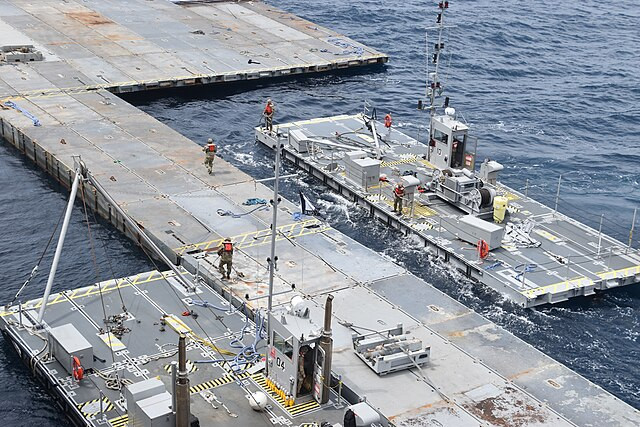The U.S. military has initiated a significant humanitarian effort in Gaza, deploying a temporary pier to facilitate the delivery of critical aid to the besieged enclave. Trucks carrying humanitarian supplies began moving ashore early Friday, utilizing the makeshift floating dock, which was constructed by the United States to counter the severe shortage of essential goods in Gaza.
The construction of the pier comes in response to a dire humanitarian crisis exacerbated by the ongoing Israeli military operations. Israel has shut off key crossings, including the Rafah and Kerem Shalom crossings, pivotal for the entry of food, fuel, and other aid supplies. This blockade has led to alarming shortages of basic necessities, pushing the region closer to famine.
U.S. Central Command confirmed the aid deliveries in a post on social media platform X, emphasizing that no American troops had entered Gaza. "This is an ongoing, multinational effort to deliver additional aid to Palestinian civilians in Gaza via a maritime corridor that is entirely humanitarian in nature," CENTCOM stated, noting that the aid is being donated by various countries and humanitarian organizations.
The new logistical route was quickly operationalized following the Biden administration's growing frustration with the humanitarian conditions in Gaza. The administration has particularly criticized Israel's ground operations in Rafah, warning that further escalation could lead to the suspension of certain arms shipments to Israel.
Israeli forces have intensified their operations in both northern and southern Gaza. The Israel Defense Forces (IDF) reported continued actions in Rafah, dismantling rocket launch sites and expanding combat zones around Jabalia in the north. Defense Minister Yoav Gallant indicated that additional troops would join the ground operations in Rafah.
At the United Nations, Israel defended its military actions at the International Court of Justice, where it faces allegations of genocide. Local health officials report that over 35,000 people have been killed in Gaza since the conflict escalated following Hamas' attacks on October 7, which resulted in approximately 1,200 Israeli deaths and around 250 hostages.
As the conflict rages on, humanitarian organizations and medical professionals are sounding alarms about the limited aid reaching Gaza. Dr. Adam Hamawy, a Palestinian American doctor volunteering in Rafah, described the dire conditions: "I see little kids running around that are basically skin and bones. Food becomes an issue where everyone is basically having a minimal meal a day."
The United Nations has acknowledged the U.S. effort, but it stressed that the temporary pier cannot be the sole solution. Issues of capacity, efficiency, and safety in a war zone are significant concerns. Vedant Patel, State Department spokesman, reiterated that the U.S. pier is intended to complement existing routes for aid delivery, not replace them. "Humanitarian conditions on the ground continue to deteriorate, and vital border crossings have closed at a time when moving more aid is critical," Patel stated.
Israel has placed blame on Egypt for delays in reopening the Rafah crossing, with Prime Minister Benjamin Netanyahu asserting that Israel wants the crossing open. However, Egypt has countered, holding Israel responsible for the closure following its takeover of the Palestinian side.




